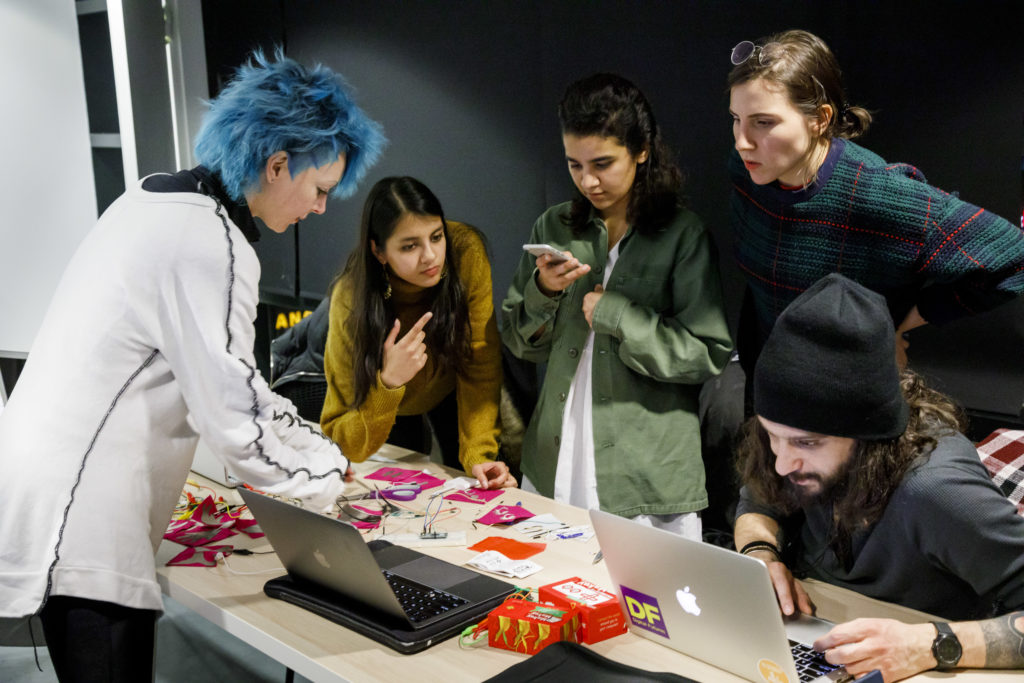
Project INSIGHTS REPORT
DMG studio startup social finance resource toolkit
Executive Summary
There is a lack of representation of Black, Indigenous and people of colour (BIPOC) women and 2SLGBTQ+ peoples in the games development industry. Marginalized communities need specific skills to succeed in this burgeoning sector of the economy.
To address this, Dames Making Games attempted to create the DMG Studio Startup Social Finance Resource Toolkit. The toolkit was intended to provide BIPOC and 2SLGBTQ+ founders of game studios with industry-specific technical and business skills, social impact and social finance training, and access to a community of peers and industry experts.
Unfortunately, due to staffing and resource challenges, the project had to be significantly scaled back, producing instead one test unit on the toolkit, Introduction to Social Impact Strategy. The content was tested with participants in DMG’s Damage Labs Studio pre-accelerator, a free 28-week program for founders from historically marginalized and underrepresented backgrounds ready to start a game studio. Despite not fulfilling original objectives, people who participated in the test unit indicated they felt adequately informed on social impact strategy, with many feeling they had a new level of awareness of alternative ways to approach growth and incorporation.
Key Insight #1
Converting in-person training curriculum to online content is time consuming and requires specialized expertise.
Key Insight #2
People who participated in the test unit gained a new level of awareness of alternative ways to approach growth and incorporation.
Key Insight #3
The games industry includes more than 32,000 jobs at more than 900 video game studios across Canada.
- In this Report
- The Issue
- What We’re Investigating
- What We’re Learning
- Why It Matters
 The Issue
The Issue
While the games studios and video games industry has become somewhat more diverse over the past few years, it is still far from providing equitable opportunities for and representation of diverse individuals. Women, people of colour, and 2SLGBTQ+ are underrepresented in the gaming workforce. This underrepresentation perpetuates the lack of representation of marginalized groups and characters in video games themselves. Marginalized individuals who are employed in the gaming industry are also more likely to experience discrimination and harassment in the workplace, and face barriers in career advancement, which result in high rates of burnout.
Many digital design programs at schools across Canada act as entry points to the game industry. However, Dames Making Games (DMG) — a Toronto-based organization that supports marginalized developers and game enthusiasts through career development, practical workshops, and business development opportunities — had heard from its leadership, membership, and industry peers that these programs are costly, presenting barriers for individuals experiencing financial precarity resulting from systemic discrimination. The programs also rarely teach soft skills, theory, or business skills, but instead focus on technical production skills and mostly target junior production positions, which are limited in the current Canadian landscape.
 What We’re Investigating
What We’re Investigating
To address these gaps, DMG proposed the development and implementation of the Studio Startup Social Finance Resource Toolkit. The toolkit was intended to lower barriers for BIPOC and 2SLGBTQ+ people to found their own gaming studios by providing them with industry-specific technical and business skills, social impact and social finance training, and access to a community of peers and industry experts.
The original project proposed the development of the toolkit drawing on the curriculum for DMG’s Damage Labs Studio pre-accelerator, a free 28-week program for founders from historically marginalized and underrepresented backgrounds ready to start a game studio. The program included lectures from instructors, group workshops, and 1-on-1 sessions with mentors.
The toolkit was intended to broaden access to the curriculum of the pre-accelerator, beyond program participants via an online learning portal. The toolkit was to cover social impact, financial literacy, operations and business planning, and the legal considerations of incorporation, all through an anti-oppressive, equitable, and intersectional lens. DMG intended to convert the existing content, designed to be delivered in-person, into asynchronous recorded lectures and workshops.
Through these activities, DMG hoped to increase the number of newly formed game studios founded and controlled by Canadian BIPOC/2SLGBTQ+ creators.
 What We’re Learning
What We’re Learning
DMG had 26 participants in two cohorts of the Damage Labs Studio pre-accelerator program. Of those cohorts, fewer than a third identified as BIPOC, three-quarters as 2SLGBTQ+ and more than two-thirds as people with disabilities or long-term illnesses.
Redefining scope
Over the course of implementation, converting the entire curriculum from the pre-accelerator program to online content for the toolkit proved challenging and beyond the organizational resources of DMG. Project staff realized that the existing curriculum required extensive adaptation for the online portal. As a result, the scope of the project was significantly reduced to create a test unit for one module of the toolkit: Introduction to Social Impact Strategy. The developed content was beta-tested with participants in the first cohort of the pre-accelerator, then again in the second cohort as part of the course offerings. Participants in the second cohort all indicated they felt adequately informed on Social Impact Strategy, with many feeling they had a new level of awareness of alternative ways to approach growth and incorporation. Unfortunately, the content of the test unit was not offered on the online platform.
Feedback cycles to iterate and better meet needs
The data collected from participants, mentors, and instructors through live feedback and dialogue allowed for a better understanding of the impact of the pre-accelerator program and the Introduction to Social Impact Strategy test unit and changes that needed to be made to better meet the needs of participants. For example, participants expressed a need for guidance on grant writing, one of the most viable financing avenues for new studios and independent creators. This topic was integrated into the curriculum for the second cohort.
Staff turnover and capacity
Unexpected leadership changes within DMG over the course of implementation resulted in this project changing hands between three leads, posing challenges for communication continuity. DMG also realized that it required a staff member with a background in formalized curriculum development for distance learning to successfully convert the existing materials to an online toolkit format. It was challenging to contract outside professionals for delivery material such as video creation for pre-recorded lectures. Overall, DMG overestimated its staff capacity to deliver on the original proposal.
 Why It Matters
Why It Matters
The games industry in Canada has expanded exponentially in the last 10 years, with more than 32,000 jobs at 900-plus video game studios across Canada, more than half of which are small companies with only a handful of employees. Of the millions of Canadians who identify as gamers, many are increasingly expecting to see themselves represented in gaming characters and storylines. To meet this need, efforts are required to increase the representation of workers who have been marginalized in this industry, like BIPOC, women, and 2SLGBTQ+. Programs like Damage Labs Studio pre-accelerator program provide in-person opportunities for these groups to learn the skills needed, but further resources are required to expand access to asynchronous, online learning.
More broadly, this project holds learning for other in-person training programs interested in transforming their existing curriculum into more widely available online content. Specifically, conversion of content is time consuming and requires expertise in virtual learning, video creation, and accessibility. Project teams should ensure they have the expertise on hand to create realistic work plans and implement planned activities.





